Le surdoué a un fonctionnement cognitif différent de la personne neurotypique (« normale »). En fait, le haut potentiel (HP) n’est pas nécessairement plus intelligent, comme on a tendance à le penser. Même si on s’accorde à dire que la douance débute à partir de 130 points de quotient intellectuel (QI) sur l’échelle de Wechsler – donc avec la WAIS -, le résultat n’est pas synonyme d’intelligence supérieure. Ou du moins, pas comme on l’imagine. Ce qu’il se passe, c’est que la personne précoce va développer deux aptitudes particulières. La première est l’hypersensibilité. J’ai rédigé plusieurs articles à ce sujet. La seconde caractéristique des zèbres est le fonctionnement intellectuel (ou cognitif, ou cérébral) exceptionnel. Cette caractéristique de l’adulte surdoué est le sujet de cet article.
Ainsi, j’aime bien résumer la douance comme étant le mélange du haut potentiel émotionnel (HPE, avec l’hypersensibilité) et du haut potentiel intellectuel (HPI, avec le fonctionnement cognitif). C’est très certainement une vision un peu simpliste du phénomène, mais je trouve qu’elle permet d’en comprendre les idées principales.
Dans un premier temps, je vais vous résumer les infos récoltées au sujet du cerveau surdoué, mais d’un point de vue purement biologique. Qu’est-ce qui fait que ça se passe comme ça ? Ensuite, on parlera des deux impacts majeurs que cela a : (1) sur le fonctionnement de la mémoire et (2) sur le système de pensée.
Disclaimer
Je vous invite malgré tout à garder un œil critique sur vos différentes lectures au sujet des surdoués et autres précoces. J’ai vite compris que, sur internet, on trouve de tout et de rien. Ce que vous lirez ici est le récit de mon expérience de jeune enfant intellectuellement précoce à maintenant, agrémenté de discussions avec ma psychologue et autres ressources scientifiques (précisées le cas échéant). Le sujet d’aujourd’hui étant le fonctionnement cognitif du zèbre, la structure de base m’est venue en suivant ce que je trouvais logique pour moi, avec mon fonctionnement cognitif différent. Elle sera peut-être différente de la vôtre, et je n’ai pas la prétention d’avoir la science infuse. À ce propos, si vous souhaitez me partager votre expérience, je serai ravi d’échanger avec vous !
Le cerveau du surdoué
Commençons donc par l’étude du cerveau sous stéroïdes de la personne surdouée.
Augmentation des connexions neuronales
Il semblerait qu’une des causes de la douance soit un fort taux de myélinisation du cerveau. De quoi s’agit-il ? En fait, pour faire simple, les myélines sont des membranes qui entourent les axones responsables des connexions entre les neurones. Elles s’assurent de la qualité des échanges neuronaux, mais également de leur vitesse.

Un haut taux de myélinisation du cerveau permet donc d’avoir des connexions neuronales plus fortes et plus rapides. De plus, chez l’enfant surdoué, les myélines continuent de se développer après l’âge de 7 ans. Chez l’enfant « normal », le processus s’arrête. Tout ce système permet au zèbre de (1) réfléchir plus vite et (2) d’apprendre davantage. Je reviendrai un peu plus tard sur le mode de pensée des surdoués, mais gardez bien en tête toutes ces informations.
Utilisation des 2 hémisphères
L’inter-connectivité du cerveau des adultes surdoués ne s’arrête pas là. Mais avant d’aller plus loin, voici un petit récapitulatif de la structure du cerveau. Il est divisé en deux hémisphères : l’hémisphère gauche, et l’hémisphère droit. Le côté gauche est généralement plus utilisé dans les tâches qui font appel au raisonnement, alors qu’à droite il s’agit plutôt de la création et de l’intuition. C’est de là que vient l’expression être cerveau gauche (ou cerveau droit). Les deux hémisphères sont reliés par ce qu’on appelle le corps calleux.
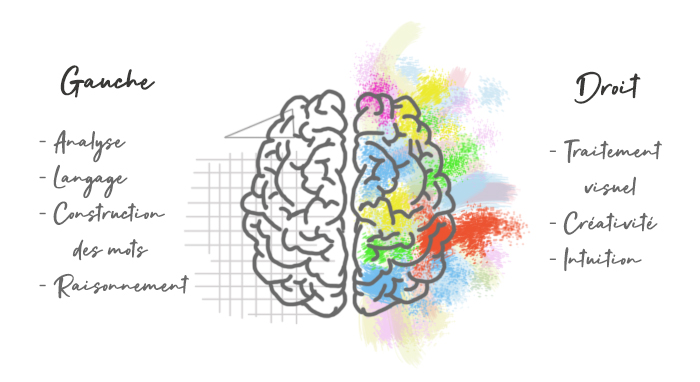
D’habitude, le corps calleux empêche une grande partie de l’information de passer d’un hémisphère à l’autre. Ainsi, lorsque l’on fait quelque chose, on active le cerveau gauche et le cerveau droit en parallèle, mais ils ne communiquent pas trop entre eux. Ils fonctionnent ensembles, mais chacun de leur côté. Or, chez les personnes à haut potentiel intellectuel, le corps calleux laisse passer les flux nerveux d’un hémisphère à l’autre. Cette super-connectivité est démontrée en passant une IRM. Voici par exemple ci-dessous la vidéo d’une étude récente réalisée à Lyon où vous pourrez découvrir leurs résultats détaillés.
Vous verrez qu’ils ont fait une distinction entre le surdoué complexe et le surdoué laminaire. Cette différenciation se produit au moment de passer les tests de QI. En fait, le test global est composé de plusieurs sous-tests (appelés subtests). Ils permettent d’établir des « sous QI » comme le QI verbal – qui fait donc partie du quotient intellectuel global. Si vous obtenez des résultats homogènes à ces subtests, on dit que vous êtes un haut potentiel laminaire. À l’inverse, si vous avez des résultats hétérogènes, vous êtes un haut potentiel complexe.
Classements supplémentaires
La charge émotionnelle ressentie par le zèbre est énorme. Il ressent les moindres variations de son environnement. Si vous cumulez cette hyper-réceptivité de l’environnement avec l’hyper-connectivité du cerveau, vous obtenez un système hors du commun. Ce qui est principalement intéressant – à mon sens – c’est que le haut potentiel va classer différemment les informations dans son cerveau. En mixant les deux hémisphères de son cerveau, il est en mesure de faire des liens nouveaux.
Dans ma tête par exemple, les souvenirs sont classés par liens logiques, par émotions ressenties, par sensations physiques que j’avais à ce moment-là, par couleur, etc. Voyez ça comme un ordinateur dans lequel chaque dossier est classé selon plusieurs critères différents, et pas seulement par ordre alphabétique.

Par la suite, les liens se font en suivant les mêmes possibilités infinies de catégories. C’est d’ailleurs ce fil de pensée improbable pour beaucoup qui traduit bien le mode de fonctionnement d’un surdoué. Mais ça, c’est un sujet pour après.
La mémoire du surdoué
Tout d’abord, on va parler de la mémorisation du surdoué.
Une mémoire à court terme ou « de travail » plus efficace
La mémoire à court terme, également appelée mémoire de travail, est la mémoire que l’on utilise pour se rappeler des petites choses du quotidien qui ne nécessitent pas d’aller dans la mémoire à long terme. Cela peut être retenir un numéro de téléphone en attendant de le noter dans notre répertoire, ou mémoriser les conclusions de plusieurs articles pour en faire une synthèse. C’est un peu comme la fonction « copier / coller » de l’ordinateur : elle peut s’utiliser pendant que l’on travaille, mais si on éteint l’appareil le texte copié (et pas encore collé) est perdu.
Chez le zèbre, cette mémoire est en moyenne plus performante que chez une personne normale. En effet, l’enfant précoce va mettre en place des stratégies de mémorisation car il est conscient de ses difficultés à mémoriser. Il est par exemple fréquent de se souvenir d’un numéro de téléphone avec des couleurs. Personnellement, je retiens les choses en me racontant des histoires dessus. Je leur imagine un story-telling, et c’est bon. On appelle cela la métamémoire.
Ça, c’était l’idée générale. Plus récemment, les recherches ont tendance à soutenir ce point de vue en ajoutant une donnée cruciale : oui, c’est vrai, mais ça dépend ! En gros, la métamémoire (ou mémoire stratégique car on met en place des stratégies pour mémoriser plus facilement) est une caractéristique générale ou de base de la douance, mais chaque individu est différent. Ainsi, un adulte surdoué peut avoir du mal à utiliser sa mémoire de travail. Ce n’est pas une « obligation ».
Favorisation de la mémoire à long terme
Comme nous l’avons vu dans la partie précédente, l’enfant à haut potentiel et l’adulte zèbre vont classer et organiser différemment les informations dans leur cerveau. Cet agencement particulier est aussi vrai pour la mémoire et la classification des souvenirs. Les liens entre eux sont plus variés et plus forts que chez une personne neurotypique.
Prenons par exemple un souvenir que je peux avoir d’un après-midi à la plage (Montpellier me manque…). Ce souvenir pourrait être uniquement lié à d’autres moments à la plage, ou à ma jeunesse dans le sud. Or, mon cerveau fait des connexions beaucoup plus nombreuses et profondes selon plusieurs caractéristiques. Par exemple, cet après-midi peut me faire penser à un moment au sauna car j’y avais chaud aussi, ou à la méditation car je me sens également détendu quand je pratique. Chaque idée est ensuite connectée à un autre nœud d’idées. Et toutes ces idées sont explorées en même temps. Je ne vous en dit pas plus, ce sera le thème du fonctionnement de la pensée (la partie suivante !).

De manière générale, le surdoué apprend et fonctionne beaucoup en utilisant sa mémoire hors du commun. Comme c’est une personne curieuse, il apprend beaucoup et sur de nombreux sujets. Les connexions inter-sujets se multiplient.
Utilisation de la mémoire pour les calculs de mathématique
On vient de voir que les hauts potentiels utilisent beaucoup leur mémoire car elle est globalement plus performante que la moyenne (plus « pleine », mais aussi organisée différemment). Cette utilisation s’applique donc à de nombreux sujets, y compris certains auxquels on ne pense pas forcément comme… les mathématiques. Vous avez certainement entendu parler des deux gros stéréotypes autour de la douance. Le premier zèbre a des difficultés scolaires et des troubles d’apprentissage. Le second, lui, semble tout à fait à l’aise à l’école, fait un (ou plusieurs) saut de classe, et ressent de l’ennui en cours. Et souvent, on prend l’exemple du fait que il (ou elle) est un génie ou un cancre en mathématique. Soit ça marche trop bien, soit pas du tout.
En fait, ces deux mythes viennent du fait que les surdoués font leurs calculs mathématiques en utilisant leur mémoire. Depuis qu’ils sont petits, ils jouent avec les chiffres. Moi, j’adorais partir de 1 et puis tout multiplier par deux jusqu’à obtenir des nombres vertigineux (1, 2, 4, 8, 16, 32, 64, 128…). En grandissant, les calculs se sont compliqués, mais ma calculatrice interne est toujours là, en fond. Petit à petit, j’ai mémorisé les résultats de ces opérations, si bien que je connais par cœur les réponses d’équations improbables… sans savoir comment je le sais ! En effet, à force, le résultat « apparaît » devant nous, mais il est très dur de se souvenir comment on en est arrivé là. Autrement dit, je n’arrive pas à reproduire le chemin que ma calculette interne à fait.
Cette difficulté explique donc le fait que certains n’arrivent pas à écrire leur raisonnement mathématique durant l’exercice (ils ne s’en souviennent pas, par contre ils sont sûrs du résultat). Elle explique également que d’autres réalisent des calculs du futur avec une simplicité déroutante. En fait, ils ont déjà mémorisé les réponses des dizaines « d’inter-calculs ».
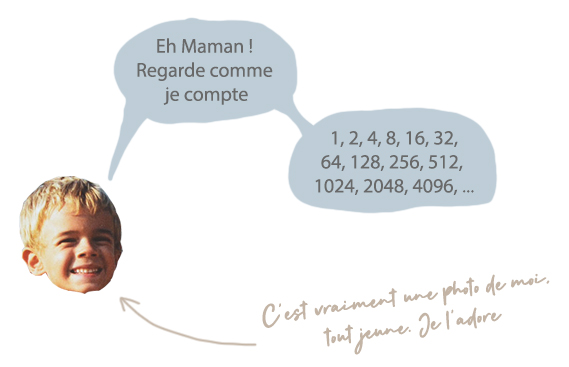
La pensée du surdoué
Comme on a commencé à le voir rapidement tout au long de cet article, les personnes surdouées ont une façon de penser qui leur est propre. L’idée, c’est que ça va vite, et dans tous les sens.
Douance et pensée multiple
Tout d’abord, la pensée va vite car, comme on l’a vu, le cerveau des zèbres a un taux de myélinisation plus important que la normale. Les connexions nerveuses se font donc plus rapidement, et de manière plus forte, plus intense. Ensuite, les deux hémisphères du cerveau qui se rejoignent offrent la possibilité de faire des liens spectaculaires entre les idées. J’avais abordé rapidement ce phénomène dans la partie sur la mémorisation. Je vais ici entrer un peu plus dans le détail.
Encore à ce jour, cette façon de penser reste mystérieuse car très difficile à démontrer. Des scientifiques ont déjà réussi à prouver l’existence de cette différence, mais pas encore d’en comprendre totalement le fonctionnement.
Pour expliquer cette pensée, deux écoles existent. La première s’appelle la pensée arborescente (ou pensée en arborescence), et la seconde est la pensée divergente. Je vais vous présenter ces deux théories (vous verrez, elles restent globalement similaires malgré tout).
Pensée en arborescence du zèbre
Pour comprendre la pensée en arborescence, il faut visualiser la pensée « normale » appelée pensée linéaire. Ici, les idées suivent une ligne. L’idée A amène à l’idée B, qui à son tour amène à l’idée C. Les liens sont logiques, et faciles à suivre si jamais on cherche à les étudier. Dans la pensée arborescente, la première idée amène à 2 voire 3 autres idées. Et chacune de ces idées amène à 2 ou 3 autres, et ainsi de suite. À la fin, on se retrouve avec un arbre gigantesque composé de plein d’idées.

Pour illustrer un peu mon propos, voici les idées qui pourraient découler du mot « bateau ». On voit clairement que la pensée linéaire ne permet d’arriver qu’à une seule nouvelle idée, alors que le zèbre a évalué plusieurs idées en parallèle pour terminer avec 4 propositions.

Cette visualisation en arborescence me pose malgré tout un problème : quand est-ce que l’arbre s’arrête ? Quand est-ce que tout repart à zéro dans mon cerveau ? En effet, tout se passe très vite et j’ai beaucoup de mal à l’identifier. Mais j’ai du mal à concevoir le fait que, à un moment, je me dise « bon, Paul, ça y est là, cette idée a été assez explorée du coup on passe à un autre arbre d’idées ». C’est pourquoi, même si cette visualisation en arborescence de la pensée du surdoué est la plus répandue, j’ai tendance à préférer la suivante : la pensée divergente.
Pensée divergente du zèbre
La pensée divergente est le fait de chercher plusieurs solutions à un problème donné, ou plusieurs idées à une idée principale. L’inverse est la pensée convergente, dans laquelle on va chercher une seule idée en lien avec plein d’autres. La pensée divergente s’ouvre au monde et cherche, tandis que la pensée convergente va plutôt identifier un dénominateur commun.
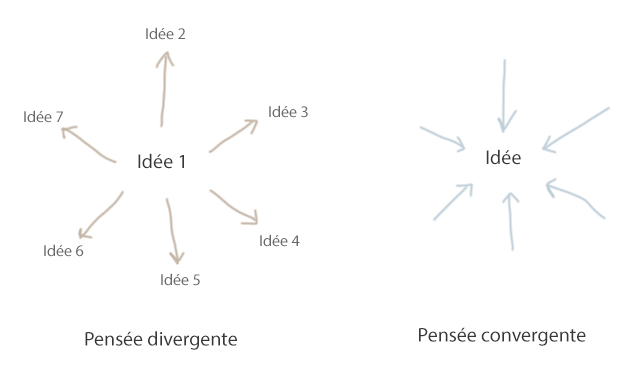
Je trouve que le concept s’apparente beaucoup à une réunion de brainstorming. Dans un premier temps on cherche des solutions variées autour d’une problématique définie (pensée divergente), puis à la fin on catégorise ces idées autour d’une notion commune ou d’un thème général (pensée convergente).
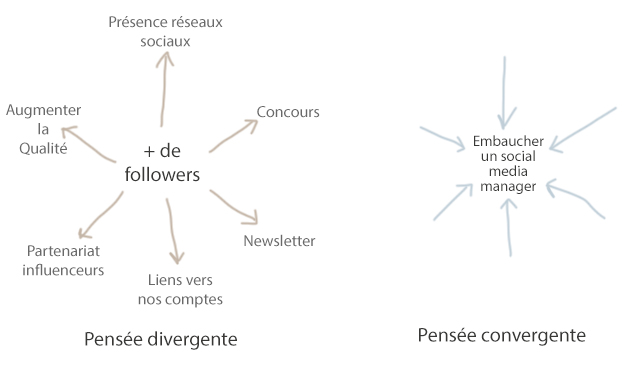
J’ai expliqué tout à l’heure que cette idée de divergence me semblait plus appropriée que l’arborescence pour exprimer ce que je ressens car, au bout d’un moment, elle n’implique plus de hiérarchie. Chaque idée est reliée à d’autres, comme une grande toile d’araignée, et il n’y a pas un seul chemin possible mais plusieurs. Pour aller d’un point A à un point B j’étudie tous les chemins. Quand je pense, je fais plein de liaisons d’idées, et je peux revenir plusieurs fois sur la même idée mais depuis une idée différente (depuis un point de vue différent si vous préférez). Dans la pensée arborescente, si l’idée ne convient pas au sein de sa branche, elle ne sera jamais revue. Ici, je peux y repasser plusieurs fois. J’ai l’impression que c’est plus proche de ce qu’il se passe quand je réfléchis.

Un raisonnement différent chez les personnes surdouées
Le système de pensée différent de l’adulte zèbre amène logiquement un raisonnement différent. Si les connexions internes ne se font pas de la même façon, le cheminement ne se fera pas non plus à l’identique. Le plus compliqué pour moi reste, je pense, l’identification du cheminement de mon raisonnement. Parfois (tout le temps), ça va trop vite et je n’ai aucune idée de comment je suis arrivé d’une idée A à une idée B. Mais même sans pouvoir expliquer la logique entre les deux, je reste persuadé qu’elles sont liées. C’est comme lorsque l’on a l’impression d’avoir déjà vu une personne : on est sûr de nous, mais impossible de savoir d’où vient le souvenir. Là, je suis sûr de la connexion entre les deux idées, mais je ne sais pas du tout pourquoi.
De ce raisonnement à part entière découle deux caractéristiques propres à la douance : la remise en question continue, et la recherche de sens – ou plutôt, le besoin de sens.
Remise en question constante « grâce » à la pensée divergente
Comme expliqué, mon fil de pensée fonctionne en continu, en fond dans mon cerveau. Cette pensée divergente a tendance à me faire voir les problèmes ou les situations sous un angle tout nouveau. En effet, j’y implémente en même temps (1) les idées que j’avais auparavant et (2) les liens que j’y fais avec ma mémoire.
C’est ce fonctionnement-là qui fait que, souvent, en partant d’un même problème que mon manager, je n’arrive pas aux mêmes solutions. C’est pour ça que les ordres hiérarchiques ne sont pas forcément les bons pour moi, car je ne valide pas leur logique. J’ai confiance en mes idées, et il m’est parfois très dur d’accepter de travailler pour quelqu’un qui va avoir des projets que je ne juge pas bons. On remet sans cesse en question le raisonnement des autres car le nôtre ne nous fait pas arriver au même endroit.
Après ça, allez dire à votre supérieur que son idée n’est pas la bonne. Allez expliquer au big boss de la boite que sa stratégie sur le long terme pourrait être améliorée, et que vous savez où il faut aller mais que vous êtes dans l’incapacité de lui expliquer votre raisonnement. C’est une discussion très compliquée à avoir.
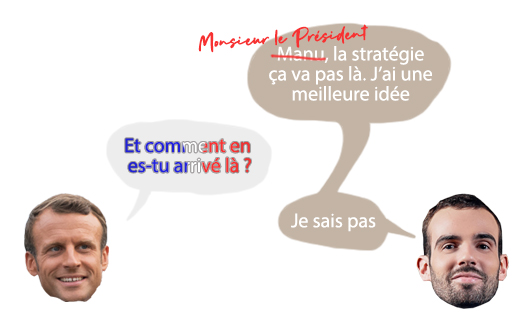
Au bout d’un moment, on se retreint. On entre en conformité avec la pensée divine de la Direction, et on se tait. Ça peut fonctionner quelques temps, mais très vite cela vient buter sur notre besoin de sens. (*Ne voyez aucun a priori politique sur cette image, je cherchais juste un moyen visuel d’illustrer « La Direction »).
Le zèbre est en recherche de sens
Les actions du zèbre ont besoin d’être justifiées, d’avoir un sens. Et un sens juste. Si on reste dans le monde de l’entreprise, ruiner l’environnement pour augmenter son bénéfice est, en soit, une justification. Cependant, ce n’est pas une justification juste ou morale. Elle ne participe pas au bien commun. Cette notion de bien commun et de Justice est très importante pour les zèbres. Il en a besoin, et a besoin d’y participer.
Le graal serait de passer ses journées en harmonie avec sa recherche interne de justice et de bon sens. C’est pour ça que rester longtemps sous les ordres de consignes que l’on considère comme injustifiées n’est pas faisable. Cette recherche-là, c’est celle de l’Ikigaï – sur lequel je reviendrai lors d’un prochain article.
Néanmoins, le fait est que cette intelligence hors du commun du surdoué peut être mise à disposition d’un but louable, et c’est généralement ce qu’il cherche. Idéalement, j’aimerais travailler dans un association qui fait le bien dans le monde. Je suis particulièrement attaché à la cause animale et environnementale, mais ce n’est qu’un détail. Mon besoin profond est d’aider. En ce sens, l’écriture de ce site me fait beaucoup de bien. Enfin, c’est surtout vos retours qui me font prendre conscience que j’aide quelques-uns d’entre vous. C’est hyper stimulant, et ça justifie complètement le temps que j’y investis.
Une relation particulière avec les mots
On entame maintenant la dernière partie de cet article : la relation particulière qu’entretiennent les zèbres avec les mots. Avant d’avancer plus loin, je pense qu’il faut expliquer un premier point. La grande curiosité intellectuelle de l’enfant précoce, de l’adolescent surdoué et de l’adulte zèbre lui permettent d’apprendre de nouvelles choses, dont des mots. Ainsi, ils obtiennent généralement une meilleure connaissance du vocabulaire que les personnes normales. Cette plus grande richesse sémantique est d’ailleurs généralement décelée lors du subtest de QI verbal.
Nous allons voir dans un premier temps ce que cette connaissance apporte dans la relation que les zèbres ont avec l’humour. Puis, nous verrons le lien entre la douance et le sens des mots et des implicites.
L’humour particulier du surdoué
Les hauts potentiels intellectuels ont tendance à beaucoup utiliser l’humour. En fait, en étant des personnes très créatives, ils font rapidement des liens et associations d’idées (on l’a vu). De plus, ils utilisent l’humour comme arme contre le stress (ils sont anxieux) et pour s’intégrer plus facilement – deux grosses difficultés auxquels font face les zèbres, comme vu dans l’article sur l’hypersensibilité.
Le problème, c’est que l’humour du surdoué peut être mal perçu. Il vole assez haut, et peut être parfois (très) intellectuel. On me considère comme quelqu’un de très drôle. Malgré tout, certaines personnes ont beaucoup de mal à comprendre les jeux de mots que je peux être en train de faire ou vont parfois trouver ça un peu bête. Les liens que je fais entre les choses ne sont pas forcément perçus par tout le monde et la blague peut parfois tomber à l’eau (oups). On m’a traité d’intello, et certains ont même eu l’impression que je me moquais d’eux !
Ce qui est dommage, c’est que j’utilise vraiment l’humour pour gérer mon stress. Je suis stressé de paraître bizarre lorsqu’il y a du monde autour de moi, alors je fais des blagues (qui peuvent être incomprises, et dans ce cas j’ai totalement foiré ma démarche de normalisation…). Quand je passais mes oraux au Bac, je faisais des blagues au jury pour soulager mon anxiété. Récemment, je suis allé à l’hôpital faire quelques analyses. J’ai vêtis mon plus bel humour (très noir !) pour me décontracter dans la salle d’attente (NDLR : les blagues sur la mort à l’hôpital, c’est pas fou). À chaque fois, il n’y a rien de méchant. Juste du stress à évacuer.


Sens des mots et des implicites
La plus grande connaissance des mots implique aussi une meilleure maîtrise de leur sens. Chaque mot a un sens précis (son sens littéral), et il ne veut pas dire autre chose. Je vais vous donner un exemple qui m’arrive souvent. Un ami m’envoie par message « Tu fais quelque chose ce soir ? ». Est-ce que :
- Il veut juste savoir ce que je fais ce soir, sans arrière-pensée ?
- Il veut me proposer que l’on aille faire quelque chose ensemble ?
- Comment ça « est ce que je fais quelque chose» ? Évidemment ! Je ne peux pas ne rien faire. Je peux rester chez moi, mais est-ce ne rien faire ? Non, je risque de lire ou regarder un film, et ça c’est faire quelque chose. Donc est-ce que je réponds juste « Oui » parce que je vais obligatoirement faire quelque chose ?
- Si j’ai déjà prévu quelque chose, est-ce qu’il veut que je lui propose de venir ?
Bref, je reste généralement un peu perplexe et j’ai appris peu à peu que la question implicite est de savoir si je suis intéressé pour faire une sortie ensemble. Mais si c’est ça la vraie question, pourquoi ne pas la poser directement ?
Conclusion
Pour conclure, la douance a de nombreux impacts sur le fonctionnement cognitif du surdoué. Tout d’abord, le cerveau des zèbres a tendance à présenter un taux de myélinisation plus important que la moyenne. Concrètement, cela signifie que les connexions neuronales sont plus importantes, plus puissantes, et plus rapides. De plus, les hémisphères gauches et droits du cerveau communiquent bien mieux. Ainsi, le fonctionnement cognitif de l’adulte surdoué est plus rapide et plus détaillé. Il met en marche les deux hémisphères et le cerveau est hyper-connecté.
Ce fonctionnement cognitif différent permet une meilleure performance de la mémoire. En effet, les souvenirs sont « classés » selon de très nombreuses catégories analytiques et sensorielles. Il en est de même pour la pensée : les liens entre les idées sont plus nombreux, plus rapides, et plus improbables. Ce raisonnement particulier conduit à une remise en question régulière de l’autorité et une recherche de sens dans la vie. Le surdoué a besoin de donner du sens à ses actions, sans quoi il va se sentir perdu. Enfin, le cerveau créatif et stressé des zèbres se défend grâce à l’humour.
Ces particularités de la douance me font conclure (comme souvent) par le fait qu’il est très important de déceler le potentiel – puis de comprendre le potentiel – afin de permettre aux enfants de s’épanouir. Même si les compétences intellectuelles sont découvertes plus tard par un(e) psy, cela ne pose pas de problème. Néanmoins, gardez en tête qu’il est préférable de repérer précocement les enfants doués.

Sources
- Bjorklund D., Gaultney J., Goldstein D., (Journal of Experimental Child Psychology), To Be Young, Gifted, and Strategic: Advantages for Memory Performance, 1996.
- Borel D., Camos V., Corbin L., (Enfance), Dissociation mémoire de travail-vitesse de traitement chez les enfants intellectuellement précoces au travers de deux études de cas, 2012.
- Davies G., Deary I., Gale C., Hagenaars S., Hill W., Maghizian O., Marioni R., McIntosh A., Ritchie S., (Molecural Psychiatry), A combined analysis of genetically correlated traits identifies 187 loci and a role for neurogenesis and myelination in intelligence, 2019.
- Lubart T., (Amphi Psychologie), Enfants exceptionnels : Précocité intellectuelle, haut potentiel et talent, 2006.
- Planche P., (L’Année Psychologique), Le fonctionnement et le développement cognitifs de l’enfant intellectuellement précoce, 2000.
